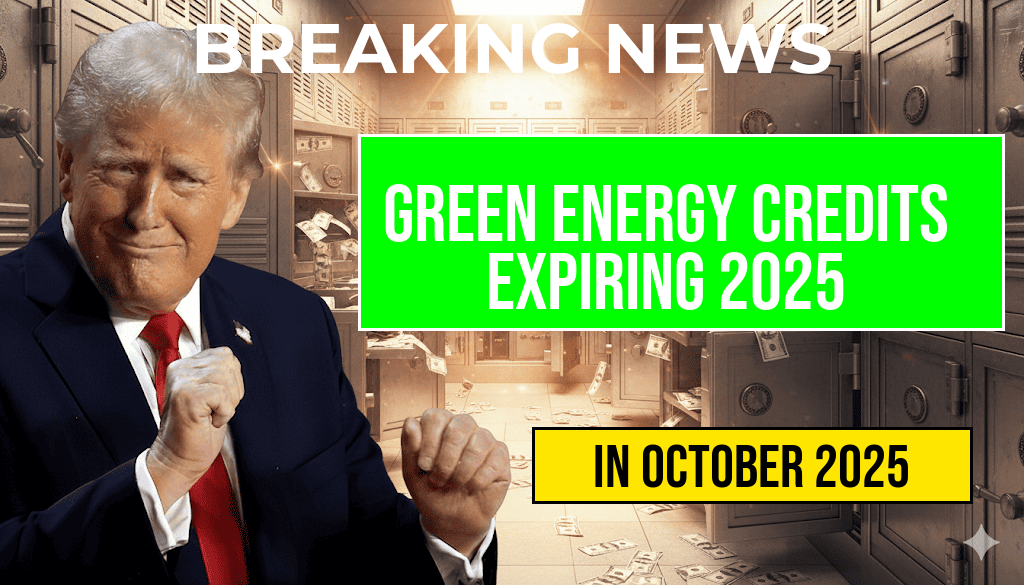Homeowners investing in green energy solutions should be aware that several federal tax credits and incentives are set to expire at the end of 2024, with many of these programs scheduled for phase-out by the end of 2025. These incentives have significantly lowered the upfront costs of solar panels, wind turbines, and energy-efficient upgrades over recent years, encouraging widespread adoption of renewable energy. As policymakers evaluate the future of these programs, property owners contemplating such investments need to understand the upcoming changes to maximize their benefits. This article explores which credits are expiring, what new policies might be on the horizon, and how homeowners can strategically plan their energy upgrades before the current incentives phase out.
Understanding the Current Landscape of Green Energy Incentives
Federal tax credits have played a pivotal role in making renewable energy more accessible for homeowners. The most prominent among these is the **Investment Tax Credit (ITC)**, which offers a percentage-based deduction on the cost of installing solar energy systems. Originally introduced in 2006, the ITC has undergone multiple extensions and revisions, with the current structure providing a **30% tax credit** for systems installed through 2023, decreasing gradually through 2024 and 2025.
Additionally, there are other incentives such as the **Residential Energy Efficiency Property Credit** and various state-level programs that complement federal efforts. However, most of these federal incentives are scheduled to expire or diminish significantly after 2025 unless Congress enacts new legislation to extend or expand them.
Key Incentives Expiring in 2025
Investment Tax Credit (ITC)
- Scheduled to decrease from 30% in 2023 to 26% in 2024, then drop to 22% in 2025.
- After 2025, the residential ITC is set to expire unless renewed or replaced by new policy measures.
- This reduction could increase upfront costs for new solar installations, impacting affordability for many homeowners.
Energy Efficiency Tax Credits
- Credits for home upgrades such as energy-efficient windows, insulation, and HVAC systems are also set to expire or reduce in scope after 2024.
- Some states may offer their own extensions or new incentives, but federal programs are limited.
Potential Policy Changes and Future Outlook
Legislative Proposals and Clean Energy Initiatives
Recent discussions among policymakers suggest a possibility of extending or expanding green energy incentives to meet climate goals and stimulate economic growth. The Inflation Reduction Act of 2022 introduced substantial provisions aimed at boosting clean energy investments, including extended tax credits and new incentives for electric vehicles and energy storage systems.
However, whether these measures will be enacted before current incentives expire remains uncertain. Homeowners considering energy upgrades should monitor legislative developments closely, as delays could impact the availability and size of future benefits.
Strategies for Homeowners Before Incentives Expire
Timing Is Critical
To maximize financial benefits, homeowners planning major energy projects should consider completing installations before the end of 2024 or early 2025. This ensures eligibility for the current higher percentage credits and avoids the impact of scheduled reductions.
Consulting with Professionals
- Engage with licensed solar contractors and energy consultants to assess project timelines and eligibility.
- Request detailed estimates that clearly outline how current incentives will influence overall costs and savings.
Exploring State and Local Incentives
Many states offer additional rebates, tax credits, or low-interest financing options that can supplement federal incentives. Visiting the Database of State Incentives for Renewables & Efficiency (DSIRE) can help homeowners identify local programs that may extend benefits beyond federal programs.
Implications for the Real Estate Market
The impending expiration of these incentives could influence home sales and renovations. Properties equipped with solar panels and energy-efficient upgrades tend to attract more buyers and command higher prices. As incentives diminish, some homeowners may accelerate their plans to capitalize on current benefits, potentially leading to a surge in installations before the end of 2024.
Summary Table of Upcoming Incentive Changes
| Incentive | Current Status | Expiration Date | Notes |
|---|---|---|---|
| Investment Tax Credit (ITC) | 30% for 2023, 26% for 2024, 22% for 2025 | December 31, 2025 | Potential reduction in upfront savings |
| Energy Efficiency Home Credits | Varies by program | December 31, 2024 | Many programs set to expire or reduce scope |
As the landscape of green energy incentives evolves, homeowners aiming to invest in sustainable upgrades should act promptly to capitalize on current benefits. Consulting with industry professionals and staying informed about legislative developments can help ensure that investments are financially optimized before reductions or expirations take effect.
Frequently Asked Questions
What are Green Energy Credits and how do they benefit homeowners?
Green Energy Credits are incentives provided by the government to encourage the adoption of renewable energy solutions. They can help homeowners reduce the overall cost of installing solar panels or other green energy systems by offering tax credits.
Why are Green Energy Credits Expiring in 2025 and what does this mean for homeowners?
The government has set an expiration date for certain Green Energy Credits to phase out or modify the incentives. This means that homeowners planning to take advantage of these credits should act before the 2025 deadline to maximize their benefits.
How can homeowners prepare for the expiration of Green Energy Credits in 2025?
To prepare, homeowners should consider scheduling solar panel installations or other renewable projects before 2025. Consulting with a certified energy professional can help optimize the timing and ensure they qualify for current tax benefits.
Will Green Energy Credits be replaced or extended after 2025?
There is ongoing legislation that could extend or modify Green Energy Credits. It’s important for homeowners to stay informed through official government updates and consult with tax professionals for the latest information.
What other tax benefits or incentives are available for homeowners interested in renewable energy?
Besides Green Energy Credits, homeowners may qualify for additional incentives such as local rebates, property tax exemptions, or state-level programs aimed at promoting renewable energy adoption. Checking with local authorities can provide comprehensive information.

Leave a Reply